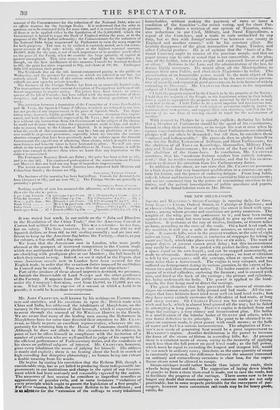THE NEW STEAM-MACH.
SQUIRE 111111 MACERONCS Steatn-Carriage is running daily, for fares, front I:t.gePt's Circus, Oxford Street, to Uxbridge or Edgeware; and at eleven o'clock, the time of its starting, the street is lined with spec- tators; among whom grooms and coachmen are pretty numerous. The knights of the whip give the preference to it ; and have been racing against it on the road, but were soon obliged to give up the contest as hopeless. It performs at the rate of twelve, fourteen, or sixteen miles an hour, according to the state of the roads. Oni a bard level road, in dry weather, it will rim a mile in three minutes, or twenty miles an hour. It ascends hills, even in the present weather, at the rate of eight miles an hour. This, of course, is exclusive of stoppages for taking in water and feel; which take place every five or six miles. The want of proper depits at present causes great delay ; but this inconvenience may easily be obviated. It is guided with perfect facility, turns within a space equal to its own length ; and can be stopped momentarily, or made to retrograde. Scarcely any smoke escapes ; no heat or vibration, is felt liy the passengers ; and the carriage, when at speed, makes no more noise than it horse-coach. The engine is very compact, and has suffered no derangement during its various journies, to the extent of be- tween two and three thousand miles. The boiler consists of a hollow square of vertical cylinders, enclosing the furnace; and is encased with iron, and fixed at the back of the carriage ; the pistons and cylinders, &c. being underneath the body. The power is applied to the hind- wheels, the fore being used to direct the carriage. The great obstacles that have prevented the success of steam-car- riages on common roads, are hilly ground and bad roads. All the car- riages that have hitherto been tried went well on bard level roads; buts they have never entirely overcome the difficulties of bad roads, or long anal steep ascents. Sir Cuaates DANCE ran his carriage to Green- wich and back, which is almost level ground all the way ; but he failed in attempting a long journey. Dateca's engine is detached from and drags the carriage; a very clumsy and inconvenient plan. his boiler is a modification of the tubular boiler of GURNEY and others, which was found defective in its principle. The point to be obtained in en- gines on common roads, is great power with small means; as the bulk of water and fuel is a serious iliconvenience. The adaptation of Earc- sox's new mode of generating heat would be a great improvement to Alaciatoxa's engine. Another desideratum is the power to increase the force of the steam ad libitum in ascending hills, &c. At present there is a constant waste of steam, owing to the necessity of applying much less than the full power on good level roads; as the full power, which must be equal to ascending the longest and steepest hill, would be too much in ordinary cases; therefore, as the same quantity of steam is constantly generated, the difference between the amount consumed on ordinary and extraordinary occasions is clear loss, for the super- litmus steam must be allowed to escape.
Steam-carriages would rather benefit than injure the roads, their wheels being broad and flat. The suggestion of laying down blocks of granite to form a stone tram-road is made, not to save the roads, but to facilitate the progress of the carriage. There seems now to be no, longer any doubt that steam-carriages on common roads are not only practicable, but in some respects preferable for the conveyance of pas- sengers, however more couvenient rail-roads may be for heavy goods,. cattle, &c






















 Previous page
Previous page